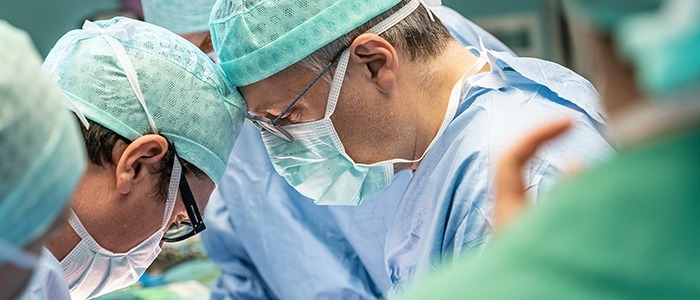Surgeons of the Women's Clinic and the Transplantation Centre of the UZ Gent recently performed the first uterine transplant in Belgium. Without complications, the woman could become pregnant with her own child, within a year at the earliest, via in vitro fertilisation (IVF) - a process of fertilisation where an egg is combined with sperm outside the body. The procedure took place a few weeks ago, but was only announced today. In the interim, the patient has undergone a number of favourable checks.
The first uterine transplant is part of a pilot study. This study investigates the possibility of transplanting the uterus of a brain-dead organ donor to a woman with Mayer-Rokitansky-Küster-Hauser (MRKH) syndrome. Every year, fifteen or so women are born in Belgium with MRKH syndrome: they have no or an underdeveloped uterus but one or both ovaries.
Prof. Dr. Steven Weyers - gynaecologist and head of the department of the Women's Clinic - is the principal investigator of the study A total of 20 patients will participate in the pilot study at UZ Gent. Prof. Weyers explains that if prospective parents make a well-considered choice for a uterine transplant, a thorough medical and psychological screening follows. If the woman qualifies, doctors start an IVF procedure. As soon as there are enough healthy embryos, doctors can proceed to transplantation. If after a year the uterus is not rejected and there are no other complications, an embryo can be implanted.
For women without a uterus - or with a uterus that cannot carry a pregnancy - the options for for having a child are limited. Adoption or surrogacy are complex procedures which, for cultural, financial, legal or other reasons, can sometimes be difficult for wish parents. Psychologist Isabelle Stuyver: “Moreover, many couples have a strong desire to be genetic, legal and social parents and to experience pregnancy and childbirth within the relationship. Carrying a child is a unique experience for a woman. That too is an important motivation for choosing a uterine transplant.”
UZ Gent is the tenth centre worldwide to perform uterine transplants. The University of Gothenburg (Sweden) has built up the greatest expertise, and the Ghent team has been closely involved in their care programme in recent years. "We were well prepared," says Prof. Weyers. ”The operation went smoothly in terms of technology and logistics. It took about 4.5 hours to implant the uterus.”
Arthur Rubinstein
The Brussels Times

